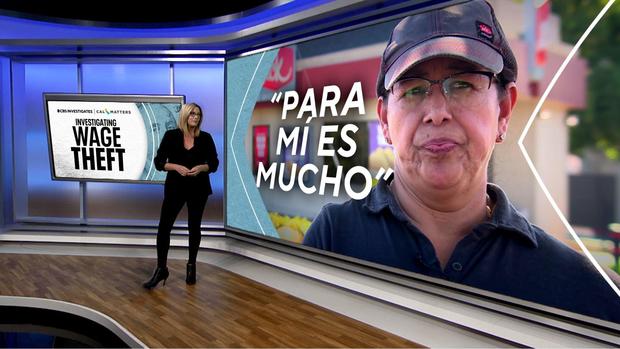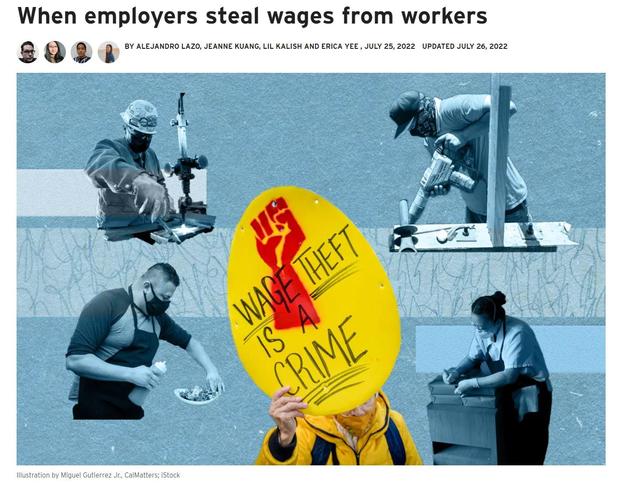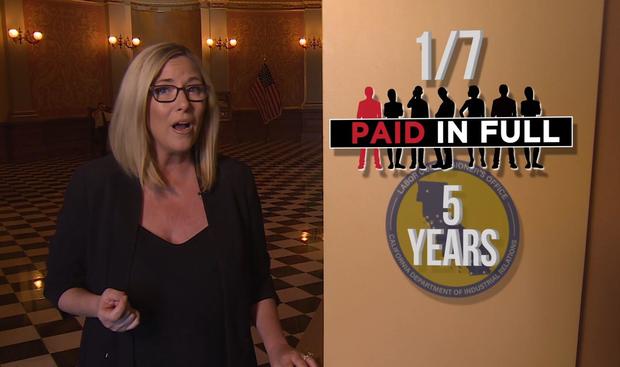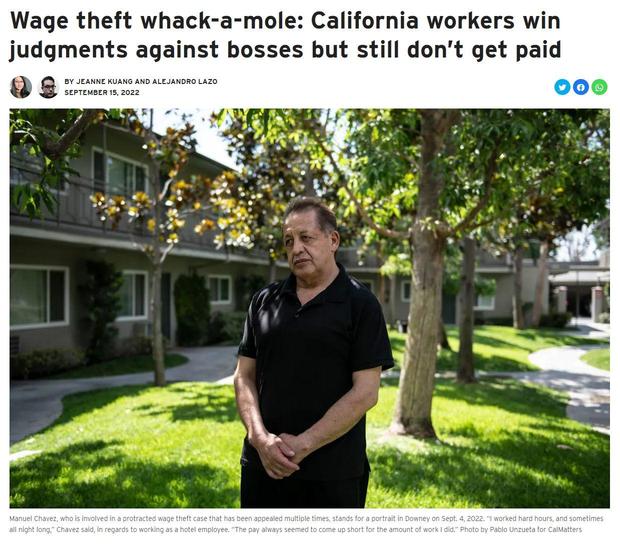Investigating Wage Theft Solutions: When workers win judgments but bosses still don't pay
SACRAMENTO – When a business loses its food permit, you may assume it's because of a health code violation. But in a growing number of California counties, it could be in response to wage theft.
In collaboration with CalMatters, we're investigating wage theft in California: Employers, essentially stealing money from their workers.
Californians file tens of thousands of wage theft claims a year ranging from stolen tips to minimum wage and overtime violations. Now a CalMatters data analysis reveals, that even after workers win wage theft judgments against their boss, many still don't get paid.
Meanwhile, a pilot program in Santa Clara County is having great success getting employers to pay outstanding wage theft judgments. Could it be expanded to offer a state-wide solution? We're getting answers.
Follow Our Continuing Coverage:
The Wage Theft Waiting Game
Growing up in his Mexican hometown, Antonio Dominguez says there were few paved roads - let alone fancy cars.
"I feel like I fulfilled that desire to be with cars," Antonio said in Spanish.
He says washing cars for a living was sort of a dream realized when he moved to the states. That is, until the car wash he worked at changed ownership.
In 2019, the Labor Commissioner's office found the Playa Vista car wash failed to properly pay Antonio and 63 others.
The state very publicly issued its largest-ever wage theft fine against a car wash business.
But Playa Vista appealed and is now negotiating a settlement.
Three years later, the workers are still waiting for the money the state says they earned. And they're not alone.
In addition to large-scale enforcement action by the Labor Commissioner's office, Californians file tens of thousands of individual wage theft claims a year. They range from stolen tips to minimum wage and overtime violations - mostly impacting low-wage workers, women, immigrants, and people of color
For people like Eloisa, a fast food worker who is just beginning her individual wage claim process, the average judgment of $20,000 could be life-changing.
That is if she can ever collect.
"It's frustrating," Eloisa said.
The problem? While state law requires claimants get a hearing and a decision in their case in under 135 days, a CalMatters data analysis found it actually takes closer to 500 days – meaning, the Labor Commissioner's office is violating state law.
But, maybe worse, five years after winning those judgments, CalMatters found only about 1 out of 7 workers was actually paid in full.
The Labor Commissioner offers this lengthy how-to guide which suggests victims send demand letters and file liens and levies against their employers to try to collect their judgments. Though the guide acknowledges many complications, especially for those who don't read or write in English.
The Labor Commissioner's Office does have the authority to recover unpaid judgments for victims by filing liens and levies on their behalf.
Representatives denied repeated interview requests from CalMatters and CBS, but in an email said, last year their office collected more than $2.8 million in wage claims on behalf of 311 workers. Compare that to the $50.5 million owed on 2,300 judgments from last year alone.
The Labor Commissioner's Office can also order a business to stop operating if they don't pay workers, though it's not clear how often they use that authority.
In contrast, a new pilot program from the Santa Clara County Office of Labor Standards Enforcement is having great success in threatening similar enforcement.
A Local Solution, A Statewide Problem
Jessie Yu, Program Manager for the Santa Clara County Office of Labor Standards Enforcement, explains that they began searching the state's list of unpaid wage theft judgments for businesses that sell food in their county, ranging from markets to bakeries to catering companies.
They threaten to revoke their food permits, essentially shutting the businesses down, until employers pay their outstanding wage theft judgments or set up a payment plan.
"All food permit holders are required to abide by all local, state, and federal laws, and regulations," Yu explained.
This line in Santa Clara County's permit application is one of the secrets to their success:
"The undersigned hereby applies for a Permit to Operate and agrees to operate in accordance with all applicable state and local regulations, laws, ordinances, and codes."
If they don't properly pay their workers, or fail to pay a wage theft judgment, the businesses are violating state law.
While Santa Clara's program is limited to food permits, Yu notes it could theoretically be expanded to any business with a required license or permit.
"What might be some of the limitations for other counties to take this on?" we asked.
"I think resources and support," Yu said.
While San Francisco has a similar program, and San Diego is now considering one, not every county has an office of labor enforcement – or the money to staff this type of program.
Another limitation? By the time the state finally issues a judgment and the county reaches out, some businesses have already shut down or changed ownership.
Santa Clara is just relaunching its pilot program, which they had to pause during the pandemic shortly after a successful start. But they say eight out of the eight initial businesses they threatened with a revoked permit, either set up a payment plan or paid their workers in full within 30 days.
"Can we take what Santa Clara County is doing and broaden it statewide?" we asked Assemblymember Ash Kalra, whose district is in Santa Clara County.
"Absolutely," he said.
While Santa Clara's program focuses on food permits, Karla said that the program could be expanded state-wide to include pulling a variety of permits and licenses across industries for any business with an outstanding wage claim judgment.
"We do have power over the ability of these businesses to operate in our state," Kalra said.
California Senator Maria Elena Durazo agrees.
"We as legislators have to take responsibility for trying to pass laws that have more teeth in them," Durazo said, adding, "Now the reality is that there's a counter influence. You get called 'job killer' by the Chamber of Commerce."
Both pro-labor lawmakers cite pushback from the California Chamber of Commerce, and other business groups, as the greatest challenge to getting meaningful wage theft accountability legislation passed.
However, Jennifer Barrera, CEO of the California Chamber of Commerce, insists that they want bad actors held accountable too.
"Enforcement really should be focused on the bad actors who are intentionally stealing wages from employees," Barrera said in a joint interview with CBS and CalMatters.
She stressed that not all wage theft violations are intentional and believes employers are often confused by California's long list of nuanced wage theft laws.
"We have the most complex labor and employment laws, I would argue, in the country," she said. "I do think that there is a way to simplify a lot of these laws and make it easier for compliance, which is ultimately what we want."
She believes the state should provide more resources to small business owners to help them better understand, and abide by, the law. She takes issue with calling all violations "wage theft."
Barrera believes that those who misinterpret complicated laws should repay employees but should not be penalized or be considered "guilty" of theft.
But what about those who are found guilty of wage theft, have exhausted all appeals, and still refuse to pay their wage theft judgments?
We asked Barrera if she would be opposed to statewide accountability legislation, similar to Santa Clara County's pilot program.
"Once the Labor commissioner has made a decision, and the right to appeal that decision has been exhausted, so it's a final judgment, those should be paid," she said.
Barrera stressed that there shouldn't be duplicative enforcement at the state and county levels, and she stressed that she would want to see the language.
"Is it something that Cal Chamber would consider drafting and proposing?" we asked directly.
Certainly, that's something that we can look into, Barrera responded.
Kalra, Durazzo, and Barrera all acknowledged that new laws would require more resources and money because the Labor Commissioner's office can't keep up as it is.
In an email, a spokesperson for the Labor Commissioner said:
"The Labor Commissioner's Office is also working to strengthen the wage claim adjudication process through strategies to expedite the resolution of claims, including utilizing enforcement tools to maximize recovery and leveraging office resources through remote claim assistance regardless of the office where the claim was filed. While the pandemic has exacerbated existing challenges, the Labor Commissioner's Office is committed to doing everything possible to reduce the time it takes for workers to have their earned wages restored, and we've already seen improvements."
But for now, tens of thousands continue to wait for the state to enforce the many wage theft laws that are already on the books.
CalMatters' Jeanne Kuang, Alejandro Lazo, and Lil Kalish contributed reporting to this story.












